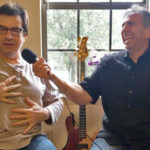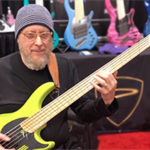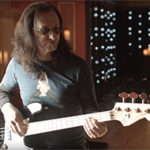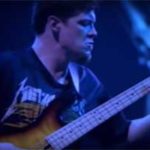Jeff Berlin alum talks learning bass, and life on the Nashville music scene
Exclusive interview with FBPO’s Jon Liebman
March 8, 2021
Photo by Jonathan H. Warren
Jon von Boehm has certainly made his musical presence known in Nashville, where he’s worked and lived for many years. A seasoned sideman and session bassist, the Pennsylvania native and former student of Jeff Berlin, and has applied his talents to a wide variety of genres, from country to television soundtracks. Over the years, he’s collaborated with the likes of Dann Glenn, Bryan Clark, Dillon Dixon, Sweet Honey, and Denny Jiosa, as well as The Spitting Image, a prog rock outfit, and The Scarlet Fray, a group that blends country and metal. When possible, von Boehm also plays regularly in country artist Aly Cutter’s band. Beyond that, he’s a composer and jazz artist in his own right. He’s released two solo albums and is currently working on a third.
FBPO: Let’s talk about the early days. Tell me about your initial exposure to music and how you became a bass player.
JvB: My grandfather was a banjo player and guitar player. He was from Kentucky and when they moved up to Erie, I came along, young grandkid. I grew up around that, always seeing someone playing, so it didn’t feel too foreign to me to have musical instruments around, and I was able to noodle with [them] every now and then when he wasn’t looking. Music always really spoke to me. I just remember listening to my uncle’s record collection for hours with the headphones on, with the big spirally cables, and the 8-tracks and stuff.
FBPO: What kind of music?
JvB: I remember Prince’s 1999. And ZZ Top’s Eliminator album. I just wore those things out! And then for whatever reason, when I was about 11 or 12, my dad came to my room and was like, “Hey, do you want to go to the music store and look at the bass guitars?” I never said, “Hey, I want to play bass,” or anything like that, but I was like, “Heck yeah, let’s go do this thing!” I came back with a bass and the rest is history.
FBPO: There must have been some reason bass was on his mind.
JvB: I think it’s because he was at a church, and the worship leader at the church played bass guitar, and it was like, “Hey, this guy, he’s pretty cool. He sings, and he plays bass guitar, and he’s doing a thing at church, so I’ll get my son into this.” It eventually clicked, when I was 15 or 16, and I realized, “Hey, I’m actually really good at this. I wouldn’t mind pursuing this a little more.” I started doing sessions around the Erie area, playing on different demos and people’s recordings. I did something for PBS when I was 18, and it kind of took off from there. After high school, I was pretty much playing full time.
FBPO: Who were your bass influences? Did you have any bass heroes?
JvB: About that time, I had the typical bass heroes for that era of my life, which would have been like the Fleas, and the Les Claypools, the Geddy Lees, Jason Newsted, all those cats. And I stumbled onto John McLaughlin, and he was playing with Jonas Hellborg.
FBPO: Yep.
JvB: Jonas had this shaved head. He was wearing Converse, he had a leather jacket with the frills on it, and I was like, “Oh my gosh, you can be cool and play jazz!” And that’s when that started really happening for me, when I discovered jazz and jazz fusion. That’s when I started to really dig a little deeper into the theory and trying to figure things out. As far as school, I was a late bloomer going to a conservatory. That happened way later. I went to The Players School of Music.
FBPO: Jeff Berlin’s school.
JvB: Yeah. I went to Jeff’s school. I didn’t go there until I was about 28. It was either there or LAMA [in Los Angeles]. But at [The Players School of Music], it just kind of spoke to me because there was music 24/7. I’d get there at 9, I’d play all day until 5. Then I would leave the school and go play around town in the Tampa area. It was pretty awesome really.
FBPO: You left Erie specifically to go to that school?
JvB: Yeah, specifically. I was happy to be there when I was, because it was kind of at the height of school. It was pretty busy at the time, and the faculty was great.
FBPO: What was it like studying with Jeff Berlin?
JvB: The very first lesson, he took all the bullshit of my playing and just threw it out the window. So that was awesome. I appreciate that more than anything. It really forced me to put my playing under a microscope. I think the biggest thing I gleaned from the school was just how to practice properly. Up until that point, I really wasn’t sure how to put my playing under a microscope.
FBPO: You seem to have gone beyond what Jeff taught you, developing your own style. I hear a lot of chording and two-handed tapping in your playing, things that Jeff is generally not known for. How did those thing come about?
JvB: By accident, really. I was hearing things that I wanted to play, but I wasn’t sure how to execute them without tapping. Initially, I wasn’t just reading bass music; I was also into piano players and guitar players. Seeing as that I’m primarily a four-string player, there would be things that a pianist would do that I also wanted to recreate, so I would have to bring my right hand up and do some tapping. Eventually that turned into a lot of figuring out tapping, tapping scales across the entire neck, and executing things that I can’t necessarily execute with the standard plucking techniques.
FBPO: You figured out the technique on your own?
JvB: Yeah, mostly. In the era when I learned it, there was no YouTube. I think it’s unique for me too because if I’m learning a Chick (Corea) solo, there’ll be things on there that I can’t really execute otherwise. It’s not that I’m executing a technique that someone else is doing, like a tapped arpeggio. I’m actually trying to tap out a line that’s being played.
FBPO: That sounds like a very healthy approach, rather than just tapping for the sake of tapping.
JvB: Well, that’s the nature of the instrument. It’s set up in a way that it can become very pattern based, which is something I have tried for many years to avoid, to allow the instrument not to be a hindrance. It can be a hindrance just because of the mechanics of the instrument.
FBPO: What do you think is important for somebody to know to play the bass?
JvB: Patience, really. It comes back to that. I know a lot of people want outcomes quickly. For me, it’s really about the journey and what I’m learning, and what I’m immersing myself in, not so much the outcome of it. The outcome will happen, but just kind of look in the present and what you’re working on to get there, especially if you’re new at it. If I had someone sit me down and tell me that in the beginning, it may have been a little easier. But for me, I enjoy the journey. I know some people, they just need the outcome and try to figure out the shortcut to get them there because that’s the kind of person they are. Everybody learns differently.
FBPO: Isn’t there something to be said for quick wins though, to keep students interested, getting them to enjoy learning bass, right from the beginning?
JvB: I like to do that by playing with them in a lesson, sort of like the reward, you know? “Here’s the reward for the day,” and play a tune that they like. And then they can start seeing the work they put in, they can start seeing those outcomes. But, yeah, patience, learning to listen, that’s the thing that separates the men from the boys.
FBPO: How long have you been in Nashville?
JvB: About 15 years now.
FBPO: Did you go there straight from Florida?
JvB: Straight from Florida, came here.
FBPO: Did you know anybody there?
JvB: I had done sessions here, prior to going to school, so after school, it just seemed like the best thing to do, to come to Nashville, since I’d already had a few connections here. It’s homey, it’s a nice community. Everybody kind of knows each other, and there’s a good scene here. You can play, do gigs, anything from jazz, to country to rock. Tons of studios.
FBPO: What’s keeping you busy these days?
JvB: I’m about as busy as a musician could be during a global pandemic. Thankfully, in Tennessee, it’s been more open. Live music’s a huge tourist draw, so they still have a lot of live music going on. Tennessee never really closed. I just feel like it was sort of a “damned if you do and damned if you don’t” kind of thing. I always had mixed feelings, but I had to play. I had to earn a living. I’ve been doing some remote sessions too, for guys in Hong Kong and Japan. I was actually supposed to be there, but the situation. Hopefully I’ll be doing a tour in Japan [around] the end of summertime. But Japan hasn’t even started their vaccination program yet, so…
FBPO: Tell me about your gear.
JvB: I am endorsing Skjold basses. I’m endorsing Phil Jones Bass, and DR strings, and Cusack pedals.
FBPO: Pete Skjold’s basses are absolutely stunning! Tell me what you like about them.
JvB: Yeah. As far as I’m concerned, he’s one of the top five luthiers in the country. I think he’s one of the best. I’m really, really picky about what I play too. I’m like a “one bass” kind of guy. I get stuck on one bass and that’s all I’ll play. With Pete’s basses, I could go to a trade show and actually play them. And then he approached me and he was like, “Hey, I really want to work with you.” And I was like, “For real?” Let’s do his thing!” I went to his shop and took one of my basses so he could see my set-up. I use a lot of legato in my playing, and my set-up was kind of low. And he nailed it!
FBPO: What else do you have going on?
JvB: I’m finishing my third record, that’s getting mixed right now. And really just playing with more like-minded cats, sharing good music with people. My quartet’s pretty killing. I want to get those guys right back out there.
FBPO: When is the new record coming out?
JvB: I hope to have it out by summer.
FBPO: Do you have a title for it?
JvB: I do. Hustle. It’s myself, and there’s vocals on this one. I played everything except drums and vocals. And I’m doing a lot of MIDI. It’s kind of a pop record, but there are still bass solos on it. I kind of wanted to show the world that you can do the pop thing on bass as well.
FBPO: What would you be if you were not a bass player?
JvB: I’d be either a pilot or some kind of scientist, probably in astronomy. I’m a nerd. I have three telescopes in my house.
See Jon’s blog, with key takeaways from this interview here.







